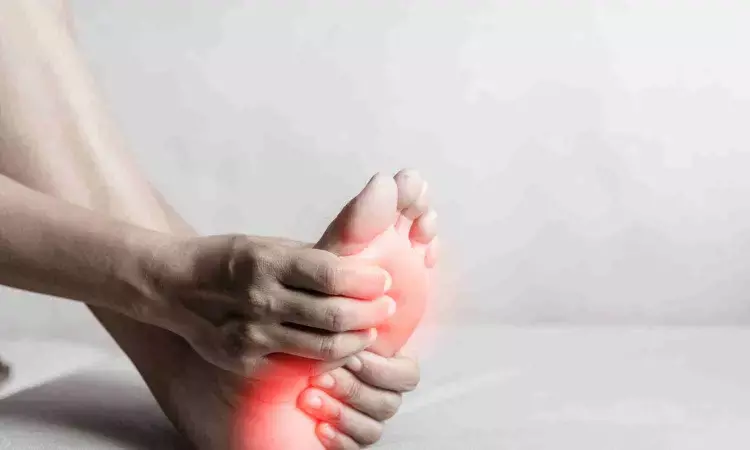- Home
- Medical news & Guidelines
- Anesthesiology
- Cardiology and CTVS
- Critical Care
- Dentistry
- Dermatology
- Diabetes and Endocrinology
- ENT
- Gastroenterology
- Medicine
- Nephrology
- Neurology
- Obstretics-Gynaecology
- Oncology
- Ophthalmology
- Orthopaedics
- Pediatrics-Neonatology
- Psychiatry
- Pulmonology
- Radiology
- Surgery
- Urology
- Laboratory Medicine
- Diet
- Nursing
- Paramedical
- Physiotherapy
- Health news
- Fact Check
- Bone Health Fact Check
- Brain Health Fact Check
- Cancer Related Fact Check
- Child Care Fact Check
- Dental and oral health fact check
- Diabetes and metabolic health fact check
- Diet and Nutrition Fact Check
- Eye and ENT Care Fact Check
- Fitness fact check
- Gut health fact check
- Heart health fact check
- Kidney health fact check
- Medical education fact check
- Men's health fact check
- Respiratory fact check
- Skin and hair care fact check
- Vaccine and Immunization fact check
- Women's health fact check
- AYUSH
- State News
- Andaman and Nicobar Islands
- Andhra Pradesh
- Arunachal Pradesh
- Assam
- Bihar
- Chandigarh
- Chattisgarh
- Dadra and Nagar Haveli
- Daman and Diu
- Delhi
- Goa
- Gujarat
- Haryana
- Himachal Pradesh
- Jammu & Kashmir
- Jharkhand
- Karnataka
- Kerala
- Ladakh
- Lakshadweep
- Madhya Pradesh
- Maharashtra
- Manipur
- Meghalaya
- Mizoram
- Nagaland
- Odisha
- Puducherry
- Punjab
- Rajasthan
- Sikkim
- Tamil Nadu
- Telangana
- Tripura
- Uttar Pradesh
- Uttrakhand
- West Bengal
- Medical Education
- Industry
Empagliflozin Shows Promise for Alleviating Peripheral Diabetic Neuropathy in Type 2 Diabetes Patients: Study

Egypt: In a significant development for type 2 diabetes mellitus (T2DM) management, a recent study has uncovered promising evidence regarding the potential of empagliflozin in mitigating peripheral diabetic neuropathy among patients. The findings, published in Medicina Clínica, shed light on a new avenue for addressing the debilitating effects of neuropathy in individuals living with diabetes.
The researchers revealed that empagliflozin may be a promising therapeutic and neuroprotective agent for diabetic peripheral neuropathy (DPN).
Peripheral diabetic neuropathy, a common complication of diabetes, affects the nerves in the extremities, leading to symptoms such as numbness, tingling, and pain. It burdens patients' quality of life considerably and is often challenging to manage effectively with existing treatments.
The study, conducted by Maha Khalifa, Clinical Pharmacy Department, Tanta Universal Teaching Hospital, Tanta University, Tanta, Egypt, and colleagues aimed to assess the probable protective effect of empagliflozin in type 2 diabetics who are suffering from DPN.
For this purpose, the researchers recruited fifty eligible type 2 diabetes mellitus (T2DM) cases with diabetic peripheral neuropathy. They were classified into two groups: Group I (control group; n=25) received placebo tablets once daily. Group II (empagliflozin group; n=25) received empagliflozin 25 mg once daily for three months.
The efficacy of empagliflozin was evaluated using HbA1c levels, and electrophysiological studies, the diabetic neuropathy symptom (DNS) score, the brief pain inventory short-form item (BPI-SF) score, the atherosclerotic cardiovascular disease (ASCVD) risk score, and the serum levels of malondialdehyde (MDA), neuron-specific enolase (NSE), and calprotectin (Calpro), lipid profile, and random blood glucose level (RBG).
The study led to the following findings:
- After three months, comparing the results of the empagliflozin arm to the control arm showed a significant improvement in the electrophysiological studies and a substantial decrease in the BPI-SF score and the mean serum levels of NSE and MDA.
- No significant difference was determined in HbA1c, Calpro, lipid profile, and RBG levels.
- The DNS and ASCVD risk scores were not significantly different.
- The NSE and MDA levels significantly negatively correlated with the electrophysiological parameters.
- The BPI-SF score showed a non-significant difference.
According to the authors, the study can be considered the first prospective clinical trial to investigate empagliflozin's effect in T2DM patients with DPN who were not on SGLT2 inhibitor treatment. Preclinical studies have proven that SGLT2 inhibitors improve nerve conduction with neuropathic pain amelioration in DM rats, so this study agreed with this preclinical study.
In conclusion, the study was conducted to detect if empagliflozin has a neuroprotective effect in T2DM and those with DPN, in addition to its impact on glycemic control. The drug ameliorated systemic oxidative stress and neuropathy with minimal to no side effects. Therefore, empagliflozin has improved DPN and the patient's QOL.
"After more studies support this concept, empagliflozin may be considered a first-line of treatment in DN cases," the researchers wrote.
Reference:
El-Haggar, S. M., Hafez, Y. M., El Sharkawy, A. M., & Khalifa, M. (2024). Effect of empagliflozin in peripheral diabetic neuropathy of patients with type 2 diabetes mellitus. Medicina ClíNica. https://doi.org/10.1016/j.medcli.2024.01.027
Dr Kamal Kant Kohli-MBBS, DTCD- a chest specialist with more than 30 years of practice and a flair for writing clinical articles, Dr Kamal Kant Kohli joined Medical Dialogues as a Chief Editor of Medical News. Besides writing articles, as an editor, he proofreads and verifies all the medical content published on Medical Dialogues including those coming from journals, studies,medical conferences,guidelines etc. Email: drkohli@medicaldialogues.in. Contact no. 011-43720751


